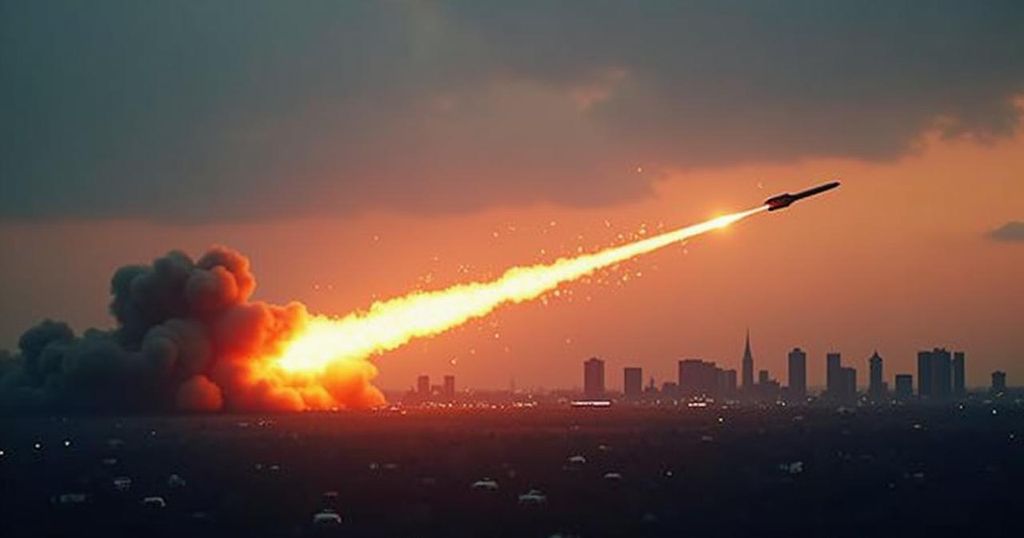Iran’s Islamic Revolutionary Guard Corps has fired numerous ballistic missiles at Israel as Turkey pledges support for Lebanon amid Israeli military operations. KLM and other airlines have suspended flights to Israel, reflecting the escalating conflict. As Israeli forces intensify operations against Hezbollah, the geopolitical landscape grows increasingly complex, with significant repercussions for local and international stability.
The Islamic Revolutionary Guard Corps of Iran has officially confirmed the launch of numerous ballistic missiles targeting Israel. Concurrently, Turkish President Recep Tayyip Erdogan has expressed his unwavering support for Lebanon, promising to aid the nation following Israel’s initiation of limited ground incursions within Lebanese territory. “We will never leave our Lebanese brothers on their own in these difficult days and will support them with all our means,” Erdogan declared during a speech at the Turkish parliament’s reopening. In response to the escalating conflict, KLM, the Dutch national airline, has announced an extension of its flight suspension to Israel until year-end, reflecting the deteriorating conditions in the area. Other airlines, including Air France and Emirates, have made similar decisions. Reports indicate a new aerial assault on southern Beirut, Lebanon. Al Jazeera continues to cover the situation from outside Israel, due to an imposed ban by the Israeli government on its reporting within the country. Israeli spokesperson Daniel Hagari has conveyed that Israeli special forces have been conducting targeted operations in Lebanon, aiming to dismantle capabilities belonging to Hezbollah’s elite Radwan unit by destroying weapon stockpiles and tunnels. As part of their strategic military efforts, Israel has also ordered evacuations in villages beyond the border, suggesting a potential escalation to a more comprehensive ground operation as they prepare to intensify their campaign. This situation prompts reflections on the complexities faced by Israeli forces, given their ongoing struggles in Gaza. Political commentator Gideon Levy highlighted these challenges, stating, “It is clear that Israel is preparing a ground operation,” but continued, “look at Gaza. Israel is stuck in Gaza without any clue how and when it will get out of Gaza; the same might happen now in Lebanon.” Moreover, Israel has reportedly struck multiple anti-aircraft facilities in southern Syria, a strategic move as part of its broader military objectives in the region. The Israeli military has additionally announced the mobilization of four additional reserve brigades to facilitate operational activities against Hezbollah. The military aims to ensure the secure return of residents in northern Israel. Human rights organizations, including Amnesty International, are calling on Montenegro and Slovenia to halt the docking of a Portuguese cargo ship suspected of carrying explosives bound for Israel, citing concerns that it would contribute to potential war crimes in Gaza.
The current context of increased military tensions in the region stems from Iran’s ballistic missile activity directed at Israel and ongoing airstrikes by Israeli forces in Lebanon and Syria. The military operations, along with international reactions and implications for civilian populations, illustrate a complicated geopolitical situation. However, responses from regional powers such as Turkey signify protective alliances, particularly for Lebanon amid these hostilities. Additionally, the ramifications of suspending international flights further emphasize the conflict’s impact on civil life and international relations. The intertwining of military operations and humanitarian concerns persists as nations assess the evolving scenario.
In summary, the escalating conflict between Iran, Israel, and Hezbollah showcases a complex interplay of military strategies and international diplomatic reactions. With Iran conducting missile strikes and Israel targeting Hezbollah’s capabilities in Lebanon and Syria, the situation remains volatile. The involvement of global players such as Turkey and the response of airlines illustrate the widespread implications of the conflict. The urgent need for a careful resolution is underlined by the growing humanitarian concerns and political instability in the region.
Original Source: www.aljazeera.com







